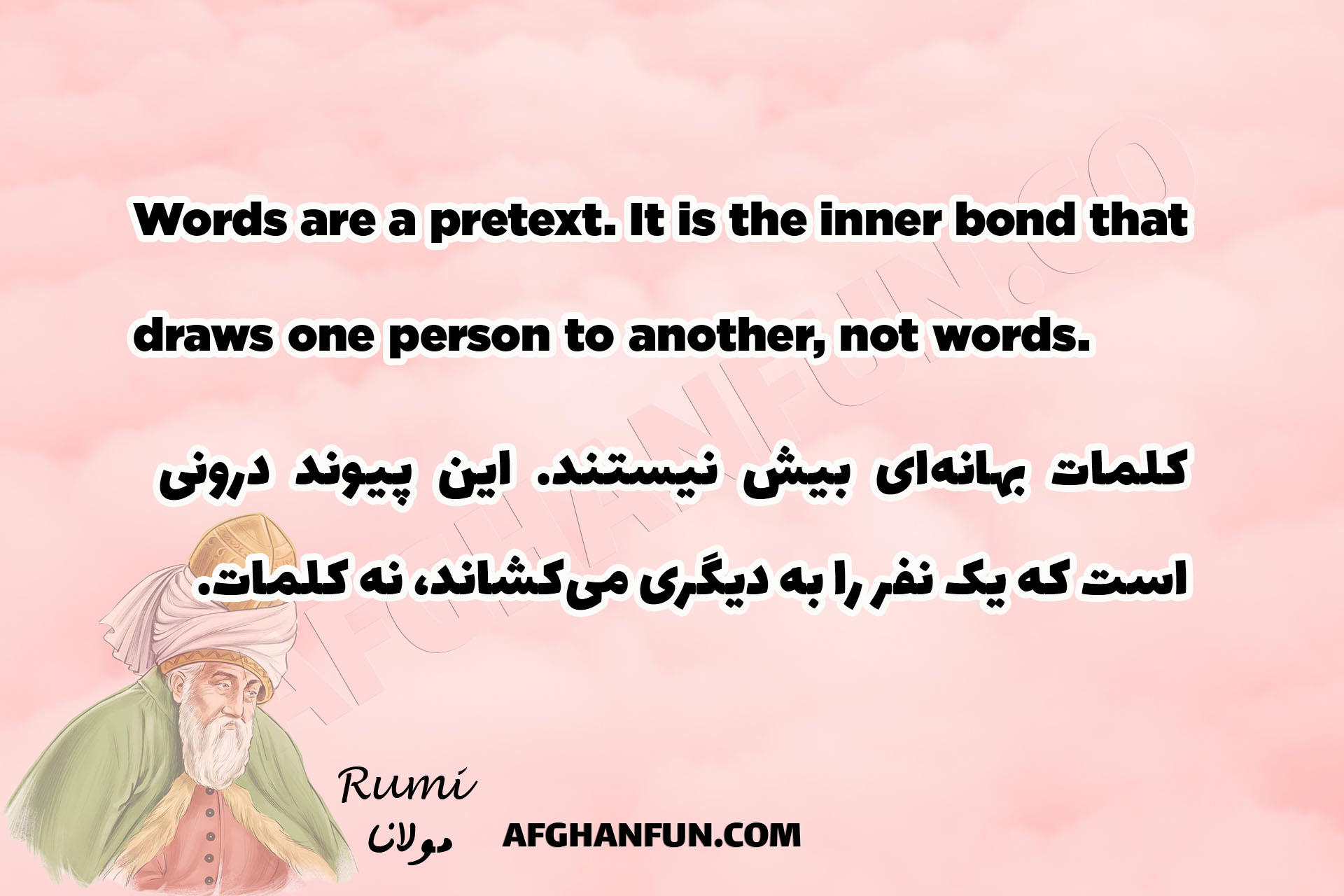This Rumi Quote Will Change How You See Relationships Forever
Words are a pretext. It is the inner bond that draws one person to another, not words.
Rumi
Rumi: Beyond Words, It’s the Inner Bond That Connects
کلمات بهانهای بیش نیستند. این پیوند درونی است که یک نفر را به دیگری میکشاند، نه کلمات.
مولانا
این جمله به ما میگوید که کلمات، هرچند مهم هستند، اما تنها ابزاری برای بیان احساسات و افکار ما هستند. چیزی که واقعاً باعث ایجاد ارتباط عمیق بین افراد میشود، پیوند قلبی و روحی آنهاست. یعنی درک متقابل، همدلی و احساس مشترکی که بین دو نفر وجود دارد. به عبارت دیگر، کلمات میتوانند دروغ بگویند، اما احساسات صادقانه هستند.
Rumi: Words Are a Pretext, True Meaning Lies Within
Каломҳо танҳо баҳонаанд. Ин пайванди ботинӣ аст, ки як нафарро ба нафари дигар мекашад, на каломҳо.
МАВЛОНО ҶАЛОЛУДДИН МУҲАММАДИ БАЛХӢ
Ин ибора ба мо мегӯяд, ки каломҳо, гарчанде муҳим бошанд, вале танҳо як абзори барои ифодаи эҳсосот ва афкор мо ҳастанд. Чизе ки воқеан боиси ба вуҷуд омадани робитаи амиқ байни одамон мешавад, пайванди қалбӣ ва рӯҳии онҳост. Яъне дарки мутақобил, ҳамдилӣ ва эҳсоси муштараке, ки байни ду нафар вуҷуд дорад. Ба ибораи дигар, каломҳо метавонанд дурӯғ гӯянд, вале эҳсосоти содиқона ҳастанд.
Rumi on Communication: Words Are Secondary to Inner Connection
الكلمات مجرد حجة، بل الرابطة الباطنية هي التي تجذب شخصًا إلى آخر، وليس الكلمات.
مولانا جلال الدین محمد الرومي
تقول هذه العبارة إن الكلمات، على الرغم من أهميتها، ليست سوى أداة للتعبير عن مشاعرنا وأفكارنا. إن ما يخلق حقًا علاقة عميقة بين الناس هو الارتباط الروحي والقَلبي بينهم. أي الفهم المتبادل والتعاطف والشعور المشترك الذي يوجد بين شخصين. بمعنى آخر، الكلمات يمكن أن تكذب، ولكن المشاعر صادقة.
This Rumi quote speaks to the essence of human connection, communication, and the deeper forces that link individuals together. Let’s break it down:
“Words are a pretext.”
Rumi begins by dismissing words as superficial or secondary. While words are important for conveying thoughts, they are merely a pretext—an excuse or a surface-level appearance that hides a deeper truth. He implies that language, while useful for communication, is not the ultimate or most profound means of connecting with others. Words, in their structure and limitations, cannot fully express the deeper emotional, spiritual, or energetic bond between people.
“It is the inner bond that draws one person to another.”
Here, Rumi emphasizes that the true force behind human connection is not linguistic but something deeper—a shared inner bond. This inner bond could be interpreted in various ways, but it suggests an intangible, non-verbal connection between individuals. It may refer to the soul’s attraction to another soul, or the silent understanding and empathy between people. This inner bond could be seen as the unspoken resonance between hearts, minds, or spirits.
The term “inner bond” implies something that transcends external appearances or formalities. It’s about a connection on a soul-to-soul level, something that words can only gesture toward but never fully capture. In many ways, this draws from a more mystical or spiritual understanding of human relationships, where the essence of a person is recognized by another without the need for verbal affirmation.
“Not words.”
This final phrase underlines Rumi’s central point: words alone are not enough. Words, no matter how eloquent or powerful, are still limited in expressing the depth of the connection that exists between individuals. What truly binds people together is not the language they speak, but the shared energy, intention, and mutual understanding that flows beneath the surface.
Deeper Themes in the Quote
- The Limits of Language: Rumi is highlighting the paradox of human communication. Language, while essential, can only communicate so much. Words describe, categorize, and explain, but they cannot fully encapsulate the richness of the human experience, especially the deeper emotional or spiritual dimensions of human relationships. This reflects a broader theme in mysticism, where the sacred is often beyond words.
- The Mystical Union: In Sufism, to which Rumi belonged, the idea of union with the Divine or with another soul is central. This “inner bond” could be seen as a metaphor for the way the soul yearns for connection with God or with others at a profound level, beyond the ego and beyond the limitations of language. It reflects a kind of spiritual recognition, where words become unnecessary because the bond is felt deeply in the heart or spirit.
- The Power of Non-verbal Communication: Rumi’s perspective affirms that communication happens on multiple levels. Even without speaking, we communicate through gestures, energy, body language, and presence. A look, a touch, or a silent moment together can sometimes convey more than words ever could. This reflects the idea that true understanding between people often transcends verbal exchange.
- Love and Intuition: The idea that it is the “inner bond” that draws people together can also be understood in the context of love and intuition. Love, in its purest form, transcends language. The bond of love between two people, whether romantic, familial, or platonic, often feels intuitive, a silent knowing that words can never fully express. This is why, in some of our most meaningful relationships, words often feel inadequate or unnecessary.
- Unity of Being: Finally, Rumi’s quote points toward the unity of all things. If the “inner bond” is the true force of connection, then it suggests that on a deeper level, all beings are already interconnected. The illusion of separation created by language, culture, and individuality fades away when we experience the deeper bond of oneness. The language of the heart transcends the divisions of the mind.
Summary
At its core, this quote is a profound meditation on the limitations of language and the infinite depth of human connection. Rumi invites us to look beyond words, to explore the silent and mystical forces that link us to each other. The real power of relationships is not found in what is said, but in what is felt, understood, and shared beyond the limits of speech. In a world where communication is often seen through the lens of words and information, Rumi reminds us that the most important connections are those that speak to our hearts, not our minds.
External Links:
This Rumi quote, found on “Goodreads“











